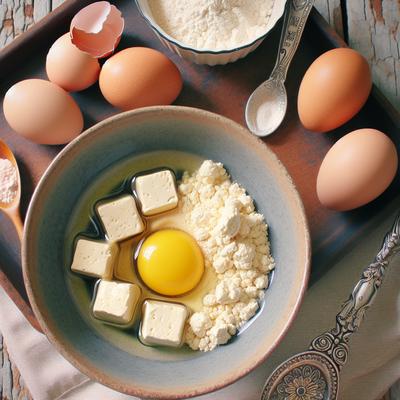Egg Substitute for Cakes
Discover the perfect plant-based solution for your baking needs with this quick and easy recipe for an egg substitute for cakes. Made with just two simple ingredients—ground flaxseed and water—this vegan alternative is an all-natural way to achieve the binding and moisture that eggs provide in traditional cake recipes. Ready in just 5 minutes, the flaxseed mixture develops a gel-like texture, mimicking the consistency of a beaten egg, making it ideal for everything from dense chocolate cakes to fluffy vanilla sponges. Whether you're catering to dietary restrictions or simply experimenting with egg-free baking, this guide to creating a flax egg substitute ensures your cakes will stay deliciously moist and cohesive.
Try SnapCalorie's FREE AI assisted nutrition tracking free in the App store or on Android.

Ingredients
- 1 tablespoon Ground flaxseed
- 2.5 tablespoons Water
Directions
Step 1
Measure 1 tablespoon of ground flaxseed into a small bowl or container.
Step 2
Add 2.5 tablespoons of water to the ground flaxseed.
Step 3
Whisk the flaxseed and water together using a fork or small whisk until well combined.
Step 4
Let the mixture sit for 5 minutes to thicken and achieve a gel-like consistency, resembling the texture of a beaten egg.
Step 5
Use the prepared flaxseed mixture as a substitute for 1 egg in your cake recipe. Repeat the process for each egg being replaced.
Nutrition Facts
| Serving size | 44 grams (44.0g) |
|---|
| Amount per serving | % Daily Value* |
|---|---|
| Calories | 37 |
| Total Fat 3.00g | 4% |
| Saturated Fat 0.30g | 2% |
| Polyunsaturated Fat 0.00g | |
| Cholesterol 0mg | 0% |
| Sodium 3mg | 0% |
| Total Carbohydrate 2.00g | 1% |
| Dietary Fiber 1.90g | 7% |
| Total Sugars 0.00g | |
| Protein 1.30g | 3% |
| Vitamin D 0IU | 0% |
| Calcium 20mg | 2% |
| Iron 0mg | 2% |
| Potassium 56mg | 1% |
Source of Calories
